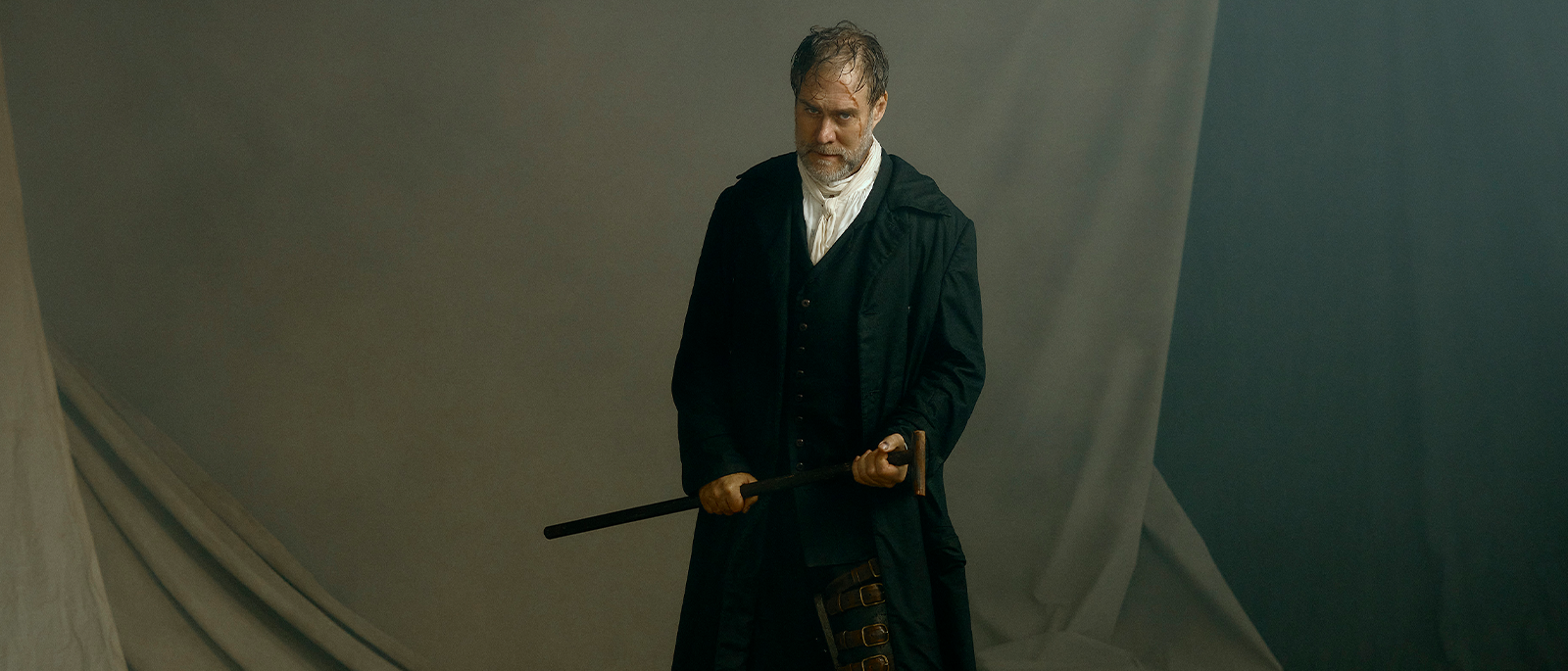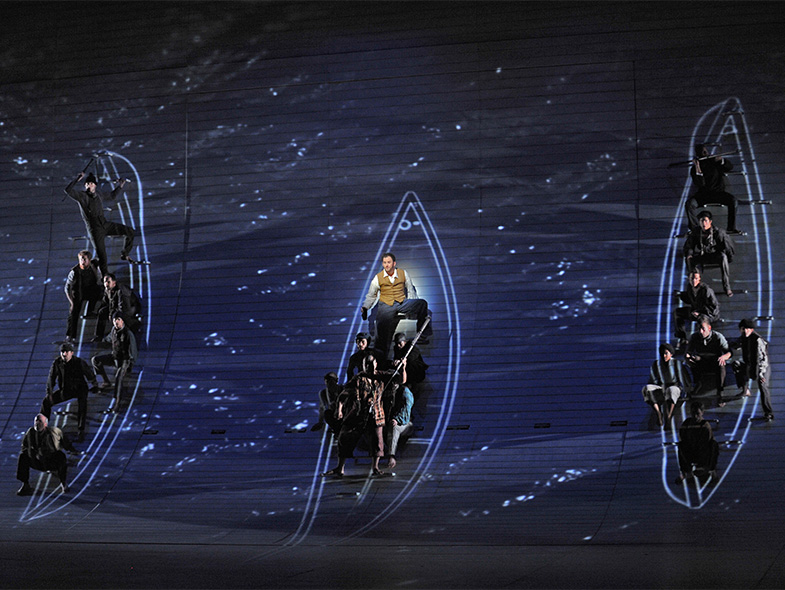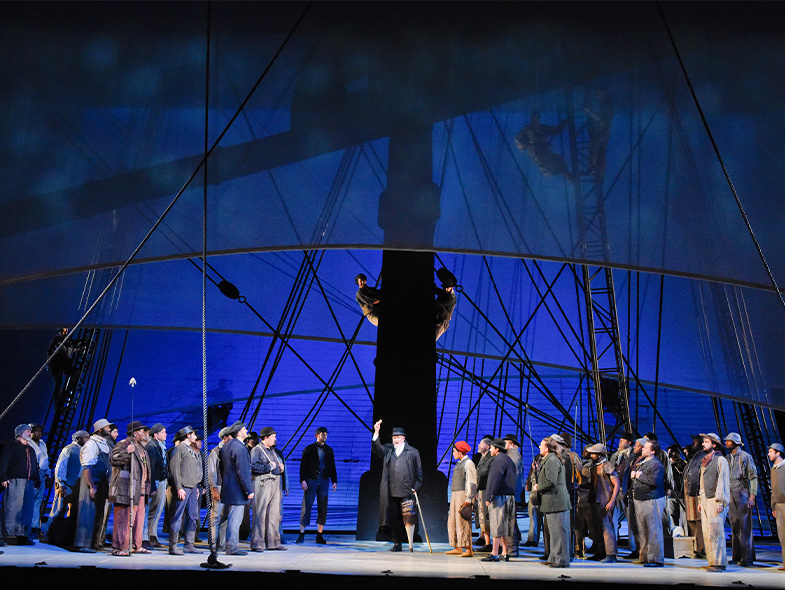
JAKE HEGGIE / LIBRETTO BY Gene Scheer
Moby-Dick
This production ran: Mar 3 - Mar 29
This production is in the past.
Overview
Following the haunting Met premiere of his first opera, Dead Man Walking, composer Jake Heggie returns to the company with his 2010 adaptation of Herman Melville’s sea-drenched, heaven-storming epic. A cast of standouts comes together on the decks of the Pequod, with tenor Brandon Jovanovich starring as the monomaniacal Captain Ahab, implacable in his pursuit of the white whale; tenor Stephen Costello as Greenhorn, the opera’s version of Ishmael; baritone Peter Mattei as the even-keeled first mate Starbuck; and bass-baritone Ryan Speedo Green as the Polynesian harpooneer Queequeg. The cast also features soprano Janai Brugger as Pip, tenor William Burden as Flask, and baritone Malcolm MacKenzie as Stubb. Maestro Karen Kamensek takes the podium for a stunning staging by Leonard Foglia that arrives at the Met newly enlarged and refined following acclaimed runs in Dallas, San Francisco, Los Angeles, and Washington, D.C.
Music by Jake Heggie
Libretto by Gene Scheer
Based on the book by Herman Melville
Production a gift of C. Graham Berwind, III and The Eugene McDermott Foundation
Additional support from Gordon P. Getty and Franci Neely
Moby-Dick is part of the Neubauer Family Foundation New Works Initiative
Production co-owned by The Dallas Opera, State Opera of South Australia, Calgary Opera, San Diego Opera, and San Francisco Opera
Languages
Languages sung in Moby-Dick
Sung In
English
Titles
Title languages displayed for Moby-Dick
Met Titles In
- English
- German
- Spanish
Timeline
Timeline for the show, Moby-Dick
Estimated Run Time
3 hrs 10 mins
-
House Opens
-
Act I
85 mins
-
Intermission
30 mins
-
Act II
75 mins
-
Opera Ends

World Premiere: The Dallas Opera, 2010
Herman Melville’s famously sprawling, richly meditative Moby-Dick is a work about nearly everything. In translating the grandiose source material for the stage, composer Jake Heggie and librettist Gene Scheer distilled the story to its core elements, while nonetheless retaining the novel’s speculative allegory alongside its gritty realism. The result is an epic, thrilling musical drama exploring the cycle of life, death, and rebirth.
Creators
Jake Heggie (b. 1961) is an American composer known for his orchestral and choral work, and especially his operas. His first, Dead Man Walking, remains the most performed contemporary opera of the last two decades and had its Met premiere on Opening Night of the 2023–24 season. The libretto is by Gene Scheer (b. 1958), an American lyricist and songwriter who frequently collaborates with Heggie. In addition to his undisputed masterpiece, Moby-Dick, American author Herman Melville (1819–91) also penned a number of other novels, short stories, and poems.

Production
Leonard Foglia

Set Designer
Robert Brill

Costume Designer
Jane Greenwood

Lighting Designer
Gavan Swift

Projection Designer
Elaine J. McCarthy

Movement Director
Keturah Stickann
FIGHT DIRECTION
Sordelet Inc.

Composer
Jake Heggie

Librettist
Gene Scheer
Setting

Melville based much of the narrative on his own experiences as a sailor between 1842 and 1845, as well as on accounts of the destruction of the whaleship Essex by an enraged sperm whale in 1820. His novel takes place in various ports (notably Nantucket) and aboard the Pequod. The opera, however, is set entirely at sea.
Articles
Videos
Music
Heggie’s score evokes the grandeur of tone and scope of the novel’s prose, and from its very first bars, delineates individuals and ideas with quasi-Wagnerian motifs. The orchestra is featured prominently, as is the all-male chorus, who give voice to a range of emotions. The opera’s most striking moments come as solo voices are combined in duets and ensembles that express the many confrontations in the human journey: good vs. evil, love vs. death, hope vs. despair.
